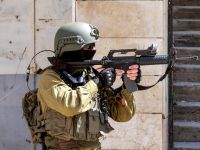Saudi Crown Prince Abdullah bin Abdulaziz al Saud, has recently shaken up the world, and the Middle East region in particular with a new peace plan in which he has proposed full Israeli withdrawal from lands captured in the 1967 war in exchange for normalization with the Arab world.
In his recent interview with the prestigious New York Times, in which the plan was brought forth, Abdullah added that he had changed his mind due to Israeli Prime Minister Ariel Sharon's measures to quell a Palestinian uprising against occupation, which erupted some 17 months ago.
In an exclusive interview with Time Magazine on Monday, the Crown Prince responded, amongst other matters, to criticism over the kingdom's relations with the United States, Islam and Osama bin Laden.
With regards to relations with the US, he said, “How can a relationship that has been strong and solid for over six decades be questioned like this? I sense that there is some resentment about the relationship and of the Kingdom that I frankly don't understand”, and added, “Somebody must be trying to drive a wedge… there is no enmity at all between the Saudi government and the American government”
On the US military presence in his country and the rhetoric regarding it, Crown Prince Abdullah said, “We don't think about raising this issue at all”. If time comes, he explained, “it will be discussed by both governments”.
As the U.S-led global war on terrorism proceeds, the Saudi leader offered these comments, ”I want to begin by saying that America is a friend. America's interests are as important to us as our own interests. America cannot fight this war alone”.
The United States, he explained, “cannot be the sole policeman of the world”. He recommended that “every nation, under U.N. auspices, should sign an international agreement and commit to combating terrorism and drugs. If a country refuses to combat terrorism and drugs, it should be punished”.
While US President George W. Bush signaled out Iraq, Iran and North Korea as forming an “axis of evil”, the Saudi Crown Prince claimed he did not “believe that the war on terrorism applies to Iran and Iraq. If you have a situation [of Iranian or Iraqi terrorism], it is the result of a small fringe group, and not government policy”.
With the Islamic Republic, in particular, he claimed “Iran is contributing to stability in the Gulf region. In the past there were tensions, but these have been worked out. Iran is a large nation, and it is in its interests and in the interests of all the Gulf countries to calm matters and maintain stability”.
When asked regarding his opinion on an American plan to use force and change the regime in Baghdad, Abdullah declined to express his ideas, but made clear, “I have given an answer on this matter to President Bush, and that is where my answer will remain”.
In an answer to a question regarding his criticism of Bush’s administrations’ stance on the Palestinian issue, the Saudi Crown Prince stated one word “justice”, and elaborated, “We have a means and a process to arrive at a solution: the Tenet Plan and the Mitchell Report”.
“On both sides are human beings who have emotions that affect their actions and reactions. On one side, we have people, including children, who are being humiliated, killed, whose trees are being uprooted, and whose land is being confiscated. This leads them to lose hope and to react. On the other side, we have people who are subjected to constant violence and begin to lose hope as well”.
As a first stage, he explained, “we can separate the two sides and introduce peacekeepers”, and in the second stage, “it will be time to pressure both sides to return to the negotiating table”.
Regarding who should be the one to exert such pressures, he expressed, “If the United States assumes the primary role, it will give the process great credibility and effectiveness. If the U.S. has no desire to contribute to this, it should let others do it”.
As a new cycle of violence erupted in the Mideast in recent weeks, the Prince also had remarks on the Palestinian leader, claiming that, “Arafat cannot control all the Palestinians. He especially cannot control them while they are being shelled and killed by the Israelis. The Israeli people may not be the guilty ones. Responsibility lies squarely with the person who gave the orders. You cannot break out of this cycle of violence when the Prime Minister of Israel orders planes to drop bombs and sends tanks to invade villages”.
In reply to a question asked regarding what may happen if Yasser Arafat would be eliminated, either physically or as a peace partner, he firmly warned, “It will shake the Arab and Muslim world and destroy the credibility of anyone who was involved in this move. Forever”.
On the September 11 attacks and their connections to the Saudi society, he said, “What occurred was a horrific crime. It changed the world. Bin Laden is a deviant who hates America. He hates us too. He used the resentment that built up against America in the Arab and Muslim world to try and justify a cruel and inhumane crime. If he were a true Muslim, he would have committed himself to live by the tenets of his faith”.
When asked whether Saudi-style Islam and the powerful religious establishment created the climate for Bin Laden, he said it was not true, “Unfortunately, extremism exists in every faith and in every nation. In the Kingdom, there was extremism by some scholars, but we see a toning down of it, and I expect that this trend will continue. Our senior religious scholars took strong public positions that had a big impact on the more extreme scholars. Some human beings have narrow or closed minds, regardless of their faith and they do not apply the noble principles of their faith”.
Up till now, the Saudi Crown Prince said, “we have not unearthed an al-Qaeda network inside the Kingdom”.
(Albawaba.com)
© 2002 Al Bawaba (www.albawaba.com)







